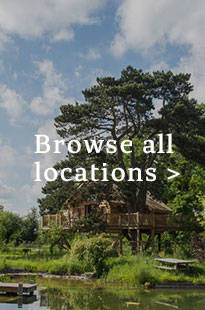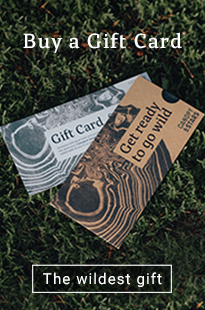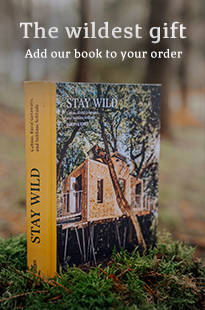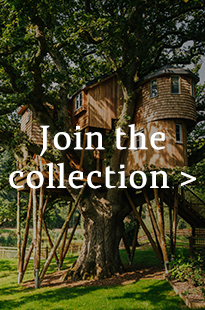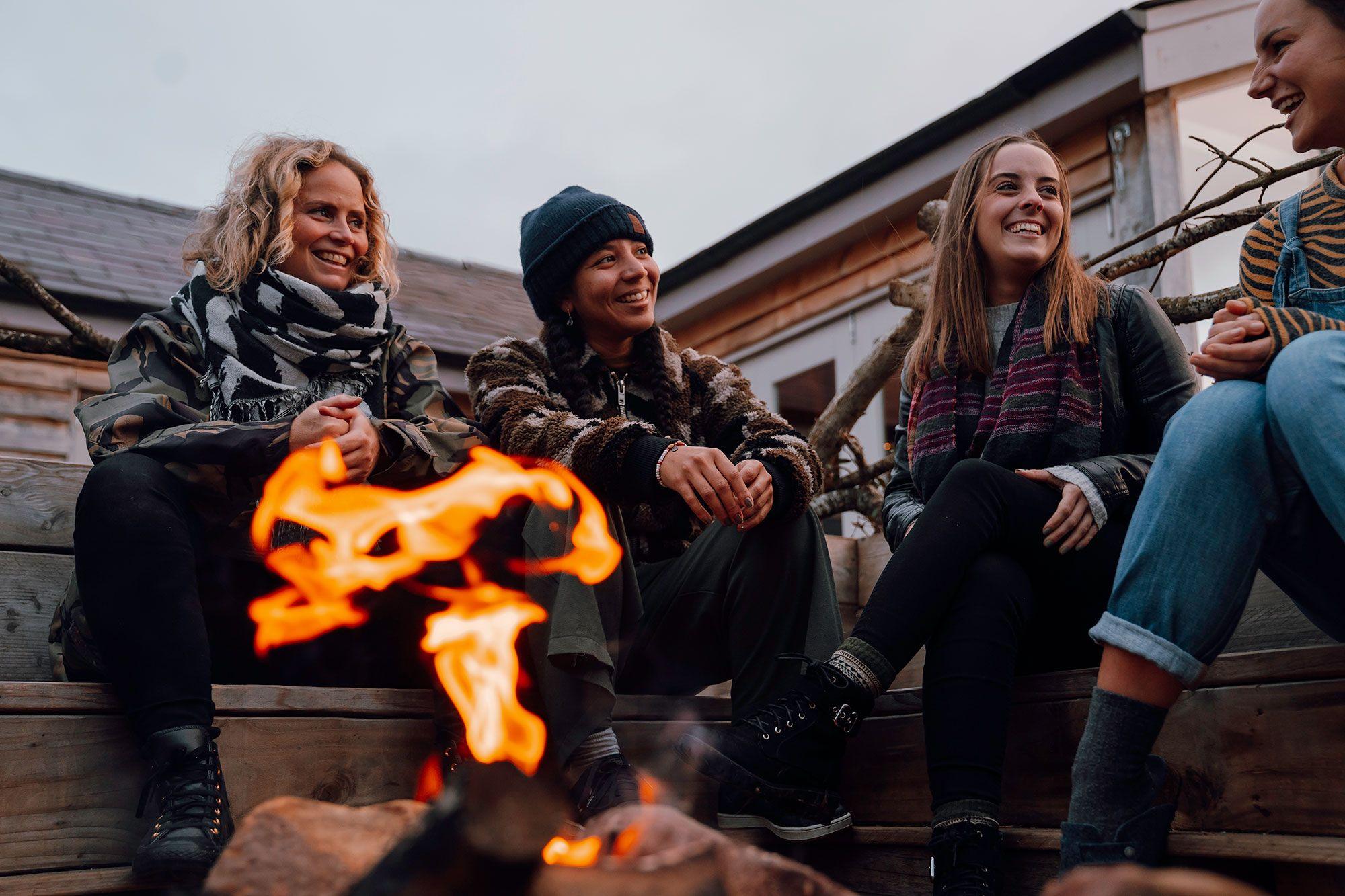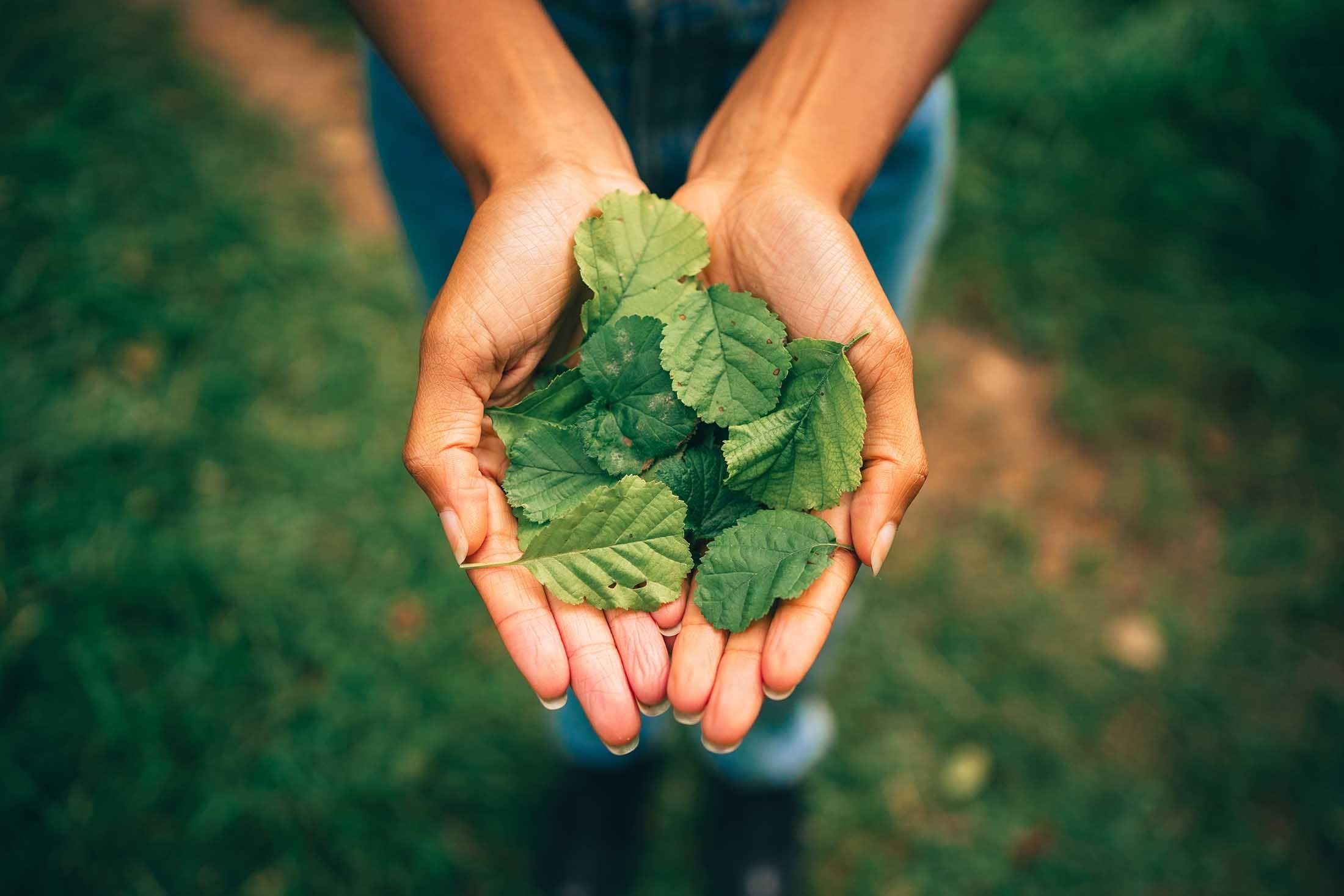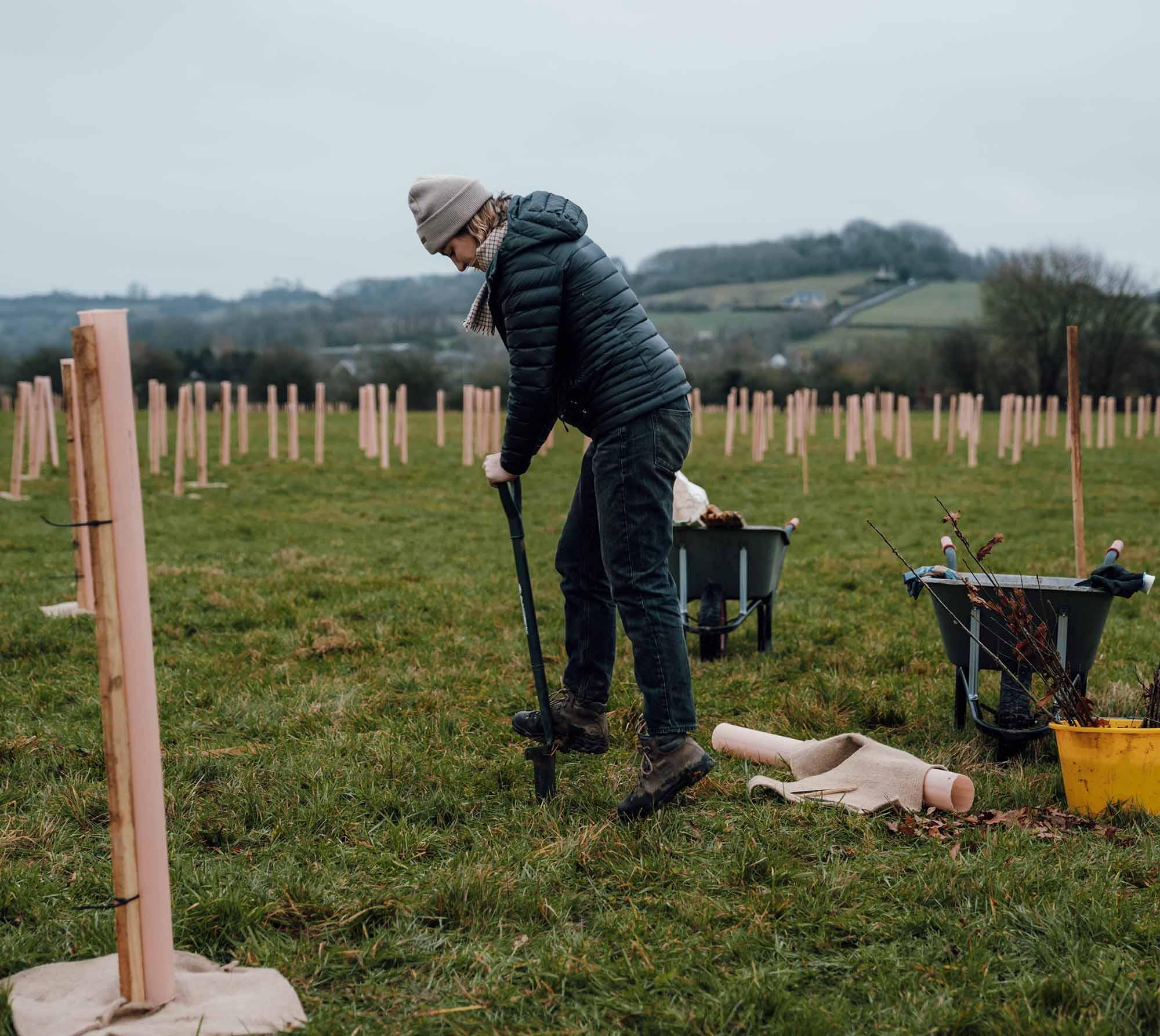- Location
- Glamping
Special occasions
- Stories
- Gift Cards
- About us
About Canopy & Stars
More from Canopy & Stars
More at Sawday's
A Life More Wild - Episode 4
Siân Lewis & Kate Humble
A nature walk with Siân Lewis
Siân Lewis is an adventurer, a travel writer and the creator of the award-winning blog, The Girl Outdoors. We've come to Bristol to talk wild swimming, microadventures and being a role model for women in the wild.
Tell us a bit about yourself?
My name is Siân Lewis, and I'm a travel and outdoor writer and blogger and journalist. So I've got a few different hats. But mostly what I write about are beginner friendly adventures for people who want to get outdoors more and explore the wild world near them. I'm particularly passionate about hiking and wild swimming and camping, and all those kinds of adventures that aren't so much extreme sports and more ways that you can get out on a weekend and explore the amazing corners of Britain that we've got; national parks and riverbanks and the ocean. We're so lucky in the UK to have amazing spaces to explore. So that's pretty much what I do.
And where are we going today?
So today we've come near the river Chew - about 15 minutes south of Bristol, to one of my favourite swimming spots, which is a deep pool in the river where you can jump in and go for a little swim. And I've been coming here a lot, especially over the last year. It's just a really lovely place to come, surrounded by reeds and there is a big field full of cows that we're in right now. So we're walking to the swim spot on the riverbank -- watch out for those cow pats.
What made you want to start writing about travel and the outdoors?
So I've always been really into the outdoors. I've really loved camping and swimming in the sea and those are things I've done since I was little. I've always felt really passionate about getting outside. I'm not particularly good at any sports, I'm not really interested in kind of being an athlete or anything like that to be honest. So I've always really enjoyed just enjoying the outdoors for what it is and ways that you can appreciate where you are - like walking and swimming - which really, I think are very mindful ways to be outside.
So when I became a journalist, I just loved the idea of combining writing and the outdoors. So I actually started my blog as a way of just basically writing about the adventures I was going on. And it was a bit of a virtuous circle, because then I wanted to go on more adventures to write about more adventures. And I've just been doing that ever since really. And I feel very lucky that I can write about the things I love.
As I got a bit older, I did a bit more adventure travel writing, which is so much fun. I've been doing a bit less of that recently, but actually doing less international travel has made me realise again how many beautiful places there are in the UK. We're so lucky, you know, we have so many incredible national parks, even for quite a little country. There's a lot of protected land, we've got this incredible coast, you can find real wilderness, and you can find spots where you're completely alone in the natural world. And I think we're so lucky to have that. So it's been quite fun to focus again, on exploring that.
We know you're passionate about the outdoors being accessible to all -- talk to us a bit more about that.
Writing about special places is really important to me but I'm also really interested in making people more aware of the fact that they can go out and do these things too, because I think a lot of people are not sure how to take the first step in the outdoors, or even are a bit nervous of trying new things like swimming or things like wild camping or going hiking on their own. There's a lot of adventures like that, that people are maybe hesitant to try. So I'm always really keen to encourage people to feel confident outdoors to go out and gain the skills they need to get outdoors.
Traditionally, I don't think you see a lot of women out there. And quite often even now when you see women, they're in a mixed group or they're with a guy. I think only recently -maybe in the last 10 years has it been a real change where I think you now see so many women, outdoors, climbing, hiking, doing things with other women, solo camping. I think there has been a safety concern over whether women are safe when they're hiking or they're camping - I do think that predominantly they are really safe and probably just as safe as on a city street. And I think women reclaiming kind of some of that outdoor space is really, really important and to realise that they really do have the capacity to get out and explore places. And you know even if you've never been camping before this, you might love it. If you've never been swimming before you might love it. There's so many little adventures that aren't stressful, that don't need to be a tough expedition, where you're up a mountain, that do help you get outside, especially if you've got kids or you're less able or you're just not sure if the outdoors is for you. There's adventures of all shapes and sizes to suit everybody. So I always really like encouraging people to get out and try new things outdoors.
And talk to us about what the term microadventure means to you?
I kind of take umbrage with his idea that adventure has to be this kind of macho extreme adventurous world where it's not a real adventure unless you've really suffered. And you know, you come back from a round-the-world cycle trip covered in mosquito bites, and you've had to like wee on mountainsides. I think that's great if that's what you're into. And I think that can be so fun as well. But that's not for everyone. And I think especially with outdoor advertising, that extreme kind of gnarly side is still what some people think, adventure is, and I actually don't think that at all, because most of us aren't like that.
Most of us have 9-5 jobs, and kids, and families and social lives and I think you can still fit adventures around that. And adventures can be whatever you want to define them as and they can be gentle, and they can be enjoyable. They don't have to be these kind of suffer-fests, unless that's what you like. You can fit a lot into a couple of hours, into an evening, into a Saturday morning. And I really loved the idea of making big adventures fit into little time, we don't have to take a lot of time off work. And you still for me still get that real lovely buzz of being outside and being adventurous. But you can still have your day-to-day life. And I don't think, there's anything less valuable about that, as opposed to you know, quitting your job and going on a six-month expedition at all, actually, I think the nice balance in life is to have a balance of adventure. And you know, the daily grind essentially. So I love it.
I think swimming is fantastic for that because you can fit a wild swim into it. I've done it, you know, cycled to a river, swam, and I'm back in an hour and a half and my day is completely different. I think sunrise and sunset are actually really wonderful too, if you pick a sunny day, if you do an hour's hike, or even a bivy or a camp at sunset, and that's really special. And it can really transform how you feel. And you can still be at work the next morning, or just pop home again for tea. There's still time for stuff like that.
Depending on where you live, e.g. if you live on the edge of a national park, you can quite often do a day's hike. And I find even in busy areas of the UK, if you go off for a two or three-hour walk, you'll quite often find that you leave the crowds behind and you're on your own. And you get beautiful views and big open spaces to yourself. And I think even if that's a day and you go home and sleep in your own bed, but still for me, that really makes me feel much much better and just gives me some headspace. But I'm one of those people where if I'm feeling stressed, if I just go and sit in my garden for 10 minutes, it helps. I think going out for any amount of time is helpful.
So where are we now?
So now we're at the river by my swim spot, which is one of my favourites. It's so quick and easy from my house. And it's just beautiful. It's a deep pool that's lined by reeds and a little bridge that goes over it. And you can kind of wade out and then you can swim in the deeper water. There's a little tiny weir running along it so there's a shallow bit, so there's often people with little children who come and paddle on hot sunny days. It's just a lovely place to be really. There's a little bit of the weir that you can sit in and it's almost like a little jacuzzi, a very cold jacuzzi. But they always say that cold water is really good for you. And the water here is always very cold because it's flowing water from the river Chew. So I just tell myself that it is physically good for me if I'm struggling. You get dragonflies here as well.
What do you love about wild swimming? Why is it special for you?
I think it's because you have to be so in the moment when you're in the water, you're literally immersing yourself in nature. And there's nothing to do but swim and be in this cold water. And we know that cold water is, physically and mentally really, really good for you. And I think it just forces me to feel calm. If you're feeling anxious or stressed, it will automatically just strip those away and you will feel peaceful. And you never ever regret having a swim. Even if it's cold, when you get in, which is not much fun. You just feel so good when you come out, you feel really tingly, and calm, and it just changes your day. And it makes me really, really focused on the world around - the flowers and the reeds and even the nettles that are lining this little riverbank, I look at them properly. And I'm really, really present. And it reminds me a bit of yoga actually, where you stop worrying about what you're doing before and after your swim and you just enjoy your swim. That really resets me mentally. And I think the only other things that make me feel like that maybe are running and hiking where you have to be present and appreciate where you are. And I remember that every single time we're going for a swim.
Any parting words?
The one thing I'd say is be careful how much outdoor adventure you do, because you will become absolutely obsessed with it and it'll be all you want to do. And if I do one swim on a Monday, I think well maybe that's me done for the week. But no, it just makes me want to swim on the Tuesday and the Wednesday and suddenly I'm just obsessed with it. But then I think that's so good for you. And I think we're not here on earth for a long time and filling day to day life with little adventures is a way to really really enjoy your time and feel like you're out and being alive really.
Off-grid retreats and switching off with Kate from Poacher's Cabin
We all need a little time off now and again, a break from that digital treadmill of notifications and communication and the right place can help you find that calming mindset. For TV presenter Kate Humble. It was a cabin in the woods in the Dordogne that became her personal refuge.
Just to set us up, paint the picture of Poacher's Cabin, where is it? What does it look like?
Oh, Poacher's Cabin is my total retreat. There's a bit of a story behind it. But essentially, when we first saw it, we had to travel down a gravel track that begins in this what the French call a lieu-dit and a lieu-dit is a sort of Hamlet really, it's essentially a farm with a few houses around it. And this track runs from the road. And initially, it runs through fields of Limousine cattle. So Poacher's Cabin is in the Limousin region of France, it's actually in the Limousin National Park. But it's right on the border with the Dordogne but it's not the Dordogne that people think of. It's the bit of the Dordogne everyone drives through to get to the bit of the Dordogne they want to go to which I'm very happy for them to do. Because it's lovely, it feels like a little secret bit of France.
So anyway, back to my track. You go down the track. And there are fields on either side with these Limousin cattle and Limousin cattle are copper coloured, they're very beautiful. They're rather muscular and kind of, you know, Gallic looking. And so there's fields of Limousin cattle that belong to Joelle, the farmer who lives at the top and this rough track descends gently at first and then it becomes wood and it becomes very dark and dense. And it's a little bit like a kind of fairytale - a Hansel and Gretel wood, and the track keeps going down and down and down and down through the trees and then it just stops. And when we first drove down it (or bumped down it, it's quite bumpy!). We got out of our camper van and walked down the slope to what was like a magic clearing in the woods. So you've been through this kind of quite dense tree cover, and suddenly it just opens up and there's a lake and it's got trees all around it. So the trees are reflected in this very dark sort of water that looks a bit like Coca Cola. It's that sort of colour and the trees and the sky are all reflected in the water. And just off to one side was this funny little kind of stone, pebble dashed shack with a roof that was all covered in moss. And it looked like a building that had sort of emerged from the kind of undergrowth like it had been covered up in the way of a Sleeping Beauty building (or like it's grown there?). Exactly, exactly. It was just this magical setting this kind fairy tale glade at the end of a lane in the middle of the woods with this just beautiful lake. And I remember standing there with Ludo my husband, and we just stood. And we just listened.
And it was so quiet. And then occasionally you'd hear the peep of a swallow or there'd be a woodpecker just tapping on the trees, or you'd then hear a frog starting to sing. And then the best sound of all just as we were standing there, we heard a Kingfisher. And you hardly ever see them, you hear them. But you suddenly get this flash of absolutely brilliant blue, going straight through the trees. And we were just like, this is magical.
How did you find it then?
So it was back in 2009/2010 - quite a long time ago anyway. And I was filming this series and it was wonderful... but it did involve just travelling all the time. So I was in need of a break and said "All I want is a shack, to swim in the river, eat tomatoes and read books for a week. I don't want to see anybody. I don't want to talk to anybody. That's all I want." And amazingly, I found a shack on a lake in the middle of France. And it turned out by glorious chance that the people who owned it - a lovely English couple called Bob and Di - who've lived in that region of France for a long time, had had a cancellation for the very week that we wanted to go. So it was like this was predestined. And it couldn't have been more perfect. And I did eat tomatoes and read books and swim in the lake. And saw very few people apart from a couple of ancient French men with proper caps and sticks going and picking mushrooms. It's very good Cep country. And it was Cep season when we were there. So they were out picking mushrooms. And we did go to the local market in the small town or big village which is called Piégut-Pluviers, and it's had a market and I'm not exaggerating, I think since 1648, like every Wednesday, and it's the most incredible, incredible market. So that's basically what we did for the week. And it was heaven. We took our dogs, you know, took the camper van. And yeah, just hung out.
At the end of the week, Bob and Di came to say, you know, "has everything been okay? Have you enjoyed it?" and we were sort of swooning at this point, it was like a holiday romance. And we just said "this is literally the best holiday we have ever, ever had" and Bob looked at me. And he'd seen me on the tele, it turns out and he said, "but you've been everywhere." And I said "well I haven't been everywhere. There's still quite a lot of places on my list". But I said "Honestly, this place is really, really special and what you've done to this cabin - to make it off grid, but it's totally self sufficient. And so comfortable and lovely". I said "it's just magical". I said "we've been having cabin fantasies, ever since we walked in" and they went "have you?!". We went "well. You know, like, in that kind of holiday romancey sort of way. Like, you think limoncello is going to be really good when you get home and it never is. You know, it's that sort of thing". And they said "well, the thing is we know of a lake for sale with a cabin on it. Do you want to go and see it?"
And this was like seven o'clock at night. We were leaving at five o'clock the next morning. We haven't packed you know, we were trying to eke out you know how you try to eke out a holiday for as long as you possibly can. And, and we were just like, "oh, hell yeah! Course we want to go and see it". So we followed Bob and Di down the track that I described right at the start, between the Limousin Cattle and into the woods. And then we found this lake with this funny, ugly little hut covered in moss. And we all stood there, and Ludo and I looked at each other and just went "I mean, most people buy a postcard and maybe a fridge magnet. And we're going to buy a lake. We are we're going to do, of course, I mean, why wouldn't be, why wouldn't we do this" and we were literally mentally going through the things we could sell to be able to do it.
And this little cabin, I think it was used by either local fishermen or the local hunt. And so we went inside, and it had this big table, and a big fireplace. And I mean, the remains of a sort of Henry the 8th type feast with sort of, you know, leg bones of some kind of animal scattered on the floor, but it had that kind of vibe, if you know what I mean. And we just said, you know, "could this ever be somewhere that you could stay and it could work like the cabin we've just stayed in?" and Bob went, "well... yeah, probably" and we said "Would you do it" and he went "okay". And we bought a lake. And then Bob started his kind of magic, we talked about how you make something so small work. And we did things like I said to Bob, if we put a kind of what I call a stoop, I spent quite a lot of time in Africa and I have this love for old tin houses with the kind of covered verandas at the front. So I said if we put a kind of covered veranda at the front, that's like an extra room. And I said something that I know - it's a middle age thing - you rarely get through the night without needing a pee, particularly because you're in France, and you're drinking a lot of rosé because it's so good. And you don't necessarily want to trek across the fields to another building to do that. So somehow we need to integrate some sort of bathroom arrangement that is part of the cabin. It had nothing at all. And there's no septic tank, there's no there's no plumbing of any description, there's no electricity. So talking to Bob, we were like, well, how can we make it practical without taking away from that essence of wildness so it has a composting loo but Bob built a kind of platform off the back so we could have space for a little composting loo which he made so beautiful. It's like the poshest composting loo you've ever seen. And, a shower with a solar pump that pumps the water from the lake into the shower. Bob built it over about a two year period. And what was so lovely was that every part of it, you know every bit of wood he can say "well, that was a tree that I cut down in this wood" or "that was a tree that fell down in the woods around Woodsman's cabin", one of his cabins. So I think it's testament to Bob's extraordinary talent. It's a piece of art. So over the years, it's just become, as I say, the place that I retreat to, and it's not a very nice analogy, but you know, it's like when something completely runs out of batteries and has to be plugged in again. That is my plugging in. It's my recharge.
What are some of the things you love about the space?
I love going to Poacher's and reading the visitors book and I've read things in the visitors book that have made me cry. Where you know, people have come and they've come from a city and they're exhausted. And we have an old telescope that belonged to Ludo's Dad. You can't really see anything, you know, we're in the trees, but we've got it there. And people turn up and I think they have usually they have plans or "we're going to go and see all these things that are in the area" or whatever. And most people say, we just didn't want to leave. We didn't want to leave. We've just sat in a hammock or we swam in the lake.
But I think for people to have that level of seclusion and peace, and somebody wrote, they'd set up the telescope and it was clearly Full Moon when they were there and they've just looked at the moon through the telescope. And it's gonna make me cry just talking about it. And she had never, never seen the moon like that. I've never seen stars like that I've never heard frogs singing. And she didn't want to go anywhere else. She said we just didn't leave. We just stayed here. And, and I think there's something lovely about that. That very quickly people seem to tap into something that I think as human beings, we all need that earthy contact, we need to be able to walk barefoot on grass, we need to be able to submerge our bodies, unencumbered by any sort of clothing in dark, cool water and watch the swallows come down and feed at the same time. We need to hear the wind in the leaves or the you know, the woodpecker pecking. Those are the things that feed our souls, and Poacher's for me, and for a lot of people who've stayed there, that's what it does for them. There's no internet, there's no phone signal. There's just nature.

